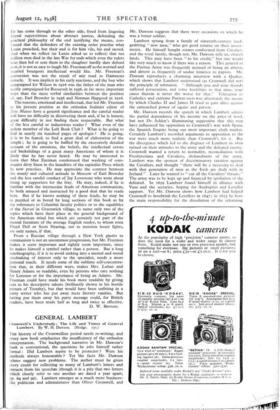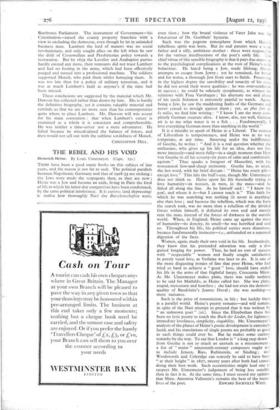Cromwell's Understudy: The Life and Times of General Lambert. By
W. H. Dawson. (Hodge. 15s.)
GENERAL LAMBERT
THE history of the Cromwellian period needs re-writing, and every new book emphasises the insufficiency of the orthodox interpretation. The background narrative in Mr. Dawson's book is conventional, the questions he asks himself rather formal : Did Lambert aspire to be protector ? Were his methods always honourable ? Yet the facts Mr. Dawson relates suggest new problems. The author must be given every credit for collecting so many of Lambert's letters and extracts from his speeches (though it is a pity that two letters which clearly refer to one another are dated a year apart, pp. 64 and 99). Lambert emerges as a much more business- like politician and administrator than Oliver Cromwell, and
Mr. Dawson suggests that there were occasions on which he was a better soldier.
Lambert sprang from a family of sixteenth-century land- grabbing " new men," who got good returns on their invest- ments. He himself bought estates confiscated from Cavaliers and the royal family, though not, Mr. Dawson tells us, church lands. This may have been " to his credit," but one would like very much to know if there was a reason. This general of the Puritan Army was frequently accused of being an atheist, and almost as frequently of undue lenience to papists. Mr. Dawson reproduces a charming interview with a Quaker, which shows that Lambert understood (as Cromwell did not) the principle of toleration. " Although you and your friends suffered persecution, and some hardships in that time, your cause therein is never the worse for that." Toleration to Catholics and extreme Puritan sects was afterwards the means by which Charles H and James II tried to gain allies against the entrenched power of squire and parson.
Mr. Dawson records the speech in which Lambert admits the partial dependence of his income on the price of wool, but not Dr. Ashley's illuminating suggestion that this may have .influenced his opposition to Cromwell's war with Spain, the Spanish Empire being our most important cloth market. Certainly Lambert's recorded arguments in opposition to the war were much more realistic than Cromwell's for it. But the divergence which led to the disgrace of Lambert in 1656 turned on their attitudes to the army and the defeated enemy. Cromwell wanted a return to normality, reconciliation with Presbyterians and Cavaliers, disbandment of the army. Lambert was the sponsor of discriminatory taxation against the Cavaliers, and thought "there will be a necessity to deal with that generation of men as the Irish are dealt with in Ireland." Later he wanted to " cut all the Cavaliers' throats." The army was to be kept up and financed by spoliation of the defeated. In 1659 Lambert found himself in alliance with Vane and the sectaries, hoping for Anabaptist and Leveller support. Yet Mr. Dawson shows how Lambert had helped Cromwell to hoodwink the Levellers in 1647; in 1653 he bore the main responsibility for the dissolution of the reforming
Barebones Parliament. The instrument of Government—his Constitution—raised the county property franchise 'with' a view to excluding the democrat, even though he let in.unlanded business men. Lambert the lord of manors was no social revolutionary, and only sought allies on the left when he saw the drift of Cromwellian and Presbyterian policy towards a restoration. But by 1659 the Leveller and Anabaptist parties hardly existed any more, their remnants did not trust Lambert and had no footing in the army, which had been effectively purged and turned into a professional machine. The soldiers supported Monck, who paid them whilst betraying them. It was too late then for a policy of military terrorism, and it was as much Lambert's fault as anyone's if the time had been missed: These conclusions are suggested by the material which Mr. Dawson has collected rather than drawn by him. His is hardly the definitive biography, yet it contains valuable material and reminds us that we are no more sure than his contemporaries quite where to place Lambert. Mr. Dawson will win assent for his main contention : that when Lambert's career is examined as a whole it is consistent and comprehensible. He was neither a time-server nor a mere adventurer. He failed because he miscalculated the balance of forces, and then would not sell out with the sublime sordidness of Monck.
CHRISTOPHER HILL.







































 Previous page
Previous page